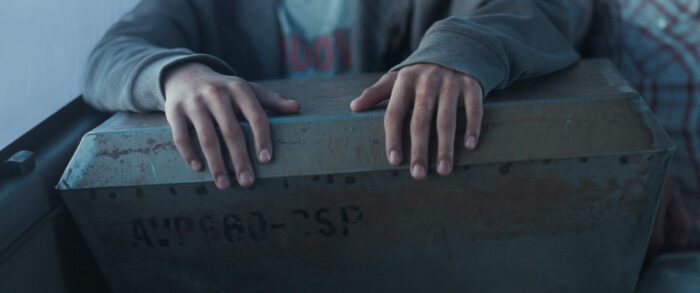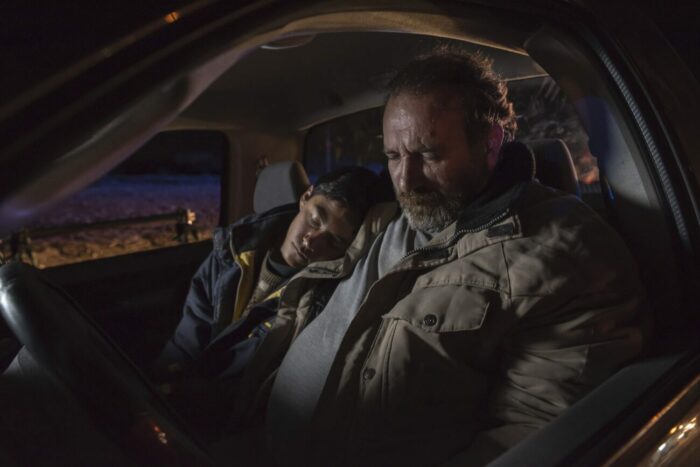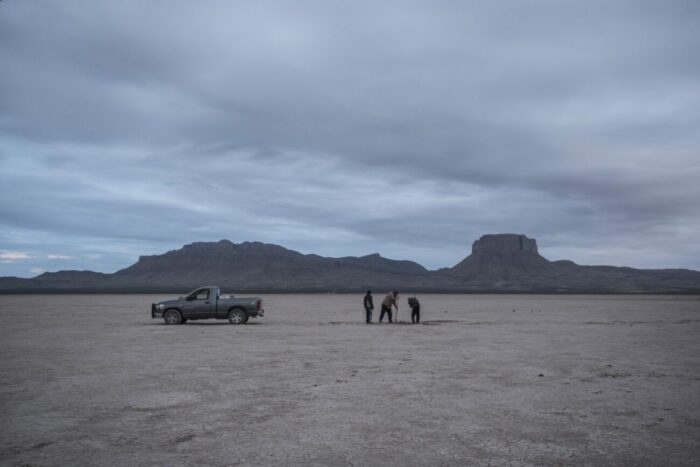It may have taken Venezuelan director Lorenzo Vigas six-plus years to deliver the follow-up to his 2015 Venice Film Festival Golden Lion Award-winning From Afar, but his newest film, The Box is, as the saying goes, worth the wait. Like From Afar and a prior short, The Box is focused on the theme of the father figure—even if its central father-son relationship is enigmatic and mysterious, gravely conflicted, and full of surprises.
The Box is set in the harsh landscape of northern Mexico, where scores of poor and underemployed seek better lives but are often betrayed by promises of steady jobs. It’s to there that young Hatzín—played by the nonprofessional actor Hatzín Navarrete—travels from Mexico City to collect the remains of his father. There he finds a mass communal grave where dozens have apparently been buried and an anonymous, uncaring bureaucracy dispensing remains and belongings to the bereaved.
It’s an unsettling opening. Who are the dead? What tragedy befell them? Young Hatzin does not know and does not ask, though the newcomer actor’s wide eyes and passive expression betray a studious, impassioned investigation that will make, for the part of the film, a detective narrative of sorts. There, confirming his identity as the son of one of the deceased, Hatzín collects a metal box of his remains and a marred, burned, defaced driver’s license depicting his father’s image.

On his way home with the box, Hatzín spots a man (Hernán Mendoza) who vaguely resembles that defaced image on his deceased father’s license. Hatzin is suspicious. Curious, he follows the man, who claims his name is not that of Hatzín’s father (“Esteban”) but instead Mario, and who refuses any connection with the boy. Hatzín, however, is nothing if not determined: he adamantly continues his investigation, continually reasserting his connection, learning more and more each day of Mario’s shadowy way of life, and eventually making his way into the man’s family business, where he becomes a wary apprentice of sorts.
That business is high-stakes; the lucrative, exploitative recruitment of factory workers to the maquiladora system of contemporary Mexico’s northern region. There, the low wages and poor working conditions assigned assembly-line workers allow Ciudad Juárez and other northern cities competitiveness in a global economy: yet the militarization of the U.S. border, anti-migrant policies, and the routine exploitation of workers seen as mere labor capital conspire to create an oppressive system.

Mario, as it turns out, is deeply implicated in that system: his lucrative position is as a recruiter, a man who delivers false promises to prospective workers, delivering them by the truckload to the factories, and, when circumstances necessitate, completing his missions with whatever violence is necessary to do so. Hatzín has found himself a father—perhaps even his own father—but he has also found a way of life that is resolutely criminal, even evil.
So, The Box becomes less of an investigative narrative and more of a high-stakes, life-of-crime, coming-of-age bildungsroman, and a great one at that. Many a teenager will cope with questions of identity, but Hatzín’s is made more complex by the mystery of his parentage (a trope dating back to Oedipus) and his finding his way into adulthood in a country where bodies pile up in numbers along roadsides, in trucks, and in mass communal graves like the one where Hatzín first went to collect his father’s remains.

It’s a harrowing, daring film, ready to take on contemporary border politics and social justice issues in the familiar guise of a story that is, at its roots, as old as any. Acclaimed Chilean cinematographer Sergio Armstrong, known for the Pablo Larrain films Ema and The Club—employs a largely static camera well suited to his protagonist’s steely gaze. Waldir Xavier’s spartan sound design announces itself as Hatzín, in the film’s opening scene, kicks rhythmically at the bathroom door on the train from Mexico City, and for the film’s 93-minute runtime eschews any use of music, isolating and amplifying the small sounds that imbue the narrative with clues and meanings.
The Box is a slow burn, requiring a viewer’s patience, but it’s wholly rewarding, a harrowing and insightful paternity thriller set in a system all too willing to exploit workers, silence whistleblowers, and dispense with those who become inconvenient.
Following its run at festivals including including Venice, Toronto, San Sebastian, BFI London, San Francisco, and Miami, The Box opens on Friday, November 4 at Cinema Village in New York City, and premieres on MUBI on Friday, November 11.



